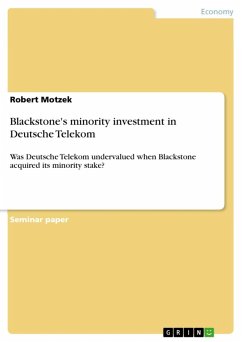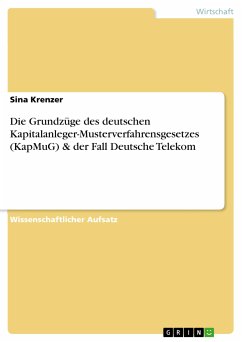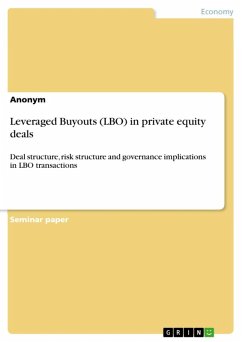Seminar paper from the year 2011 in the subject Business economics - Investment and Finance, Harvard University, course: Behavioral and Value Investing, language: English, abstract: 1. INTRODUCTION On 24 April 2006, the private equity company Blackstone acquired 4.6% of the shares of publicly listed German telecom incumbent Deutsche Telekom (DT) at a share price of EUR14 for a total of EUR2.7bn. According to Blackstone, DT was undervalued when compared to European peers. This paper has three objectives: 1) To apply various established value investing valuation techniques to assess whether DT was indeed undervalued at Blackstone's entry. 2) To explore which operational and share price performance Blackstone might have anticipated for DT in order to reach a typical private equity IRR of 25% over five years. 3) To review subsequent events and DT's performance since Blackstone's entry and to specify what would need to happen to at least recover Blackstone's investment. 1.1 Company and shareholder overview Deutsche Telekom is the German telecom incumbent and was Europe's largest telecom operator with sales of EUR59.6bn in 2005. The company generated 57% of its sales in Germany, another 22% in other European countries (mainly the United Kingdom) and the remaining 20% in North America. In terms of business areas, mobile communications accounted for 48% of its revenues, broadband/fixed network made up 36% and business customers 15%. DT's largest shareholder was the German government which held 15.2% of DT's shares directly and controlled another 17.3% via the German state-owned bank Kreditanstalt für Wiederaufbau (KfW). The remaining 63% were held by a fragmented institutional and private investor base. 1.2. Transaction details Blackstone bought its stake directly from KfW at a 2.6% premium to DT shares' trading price of EUR13.65, implying a total market capitalization of EUR58.8bn and an enterprise value of EUR97.4bn. In the fifth largest private equity investment ever observed in Germany, Blackstone agreed to a lock up period of two years to show its commitment as a long term investor. In return, it received one seat on DT¿s supervisory board and KfW agreed not to sell any further DT shares within one year. 85% of Blackstone's total investment was financed with a margin loan provided by Deutsche Bank.
Dieser Download kann aus rechtlichen Gründen nur mit Rechnungsadresse in A, B, BG, CY, CZ, D, DK, EW, E, FIN, F, GR, HR, H, IRL, I, LT, L, LR, M, NL, PL, P, R, S, SLO, SK ausgeliefert werden.









